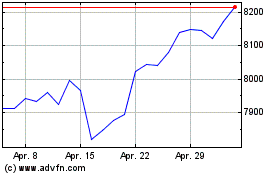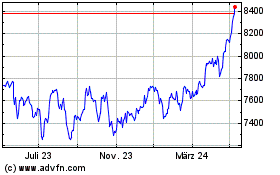By Jason Douglas
LONDON -- Although Britain left the European Union on Friday,
more than three years after voters chose to exit from the bloc, the
terms of their future economic relationship still have to be
thrashed out.
That means that, after a spell of uncertainty and political
turmoil that hammered investment and slowed growth, executives are
still in the dark over essential questions on tariffs and
regulations.
"We haven't got 100% certainty, which is what business needs,"
said Nik Kotecha, chief executive of Morningside Pharmaceuticals
Ltd., a drugmaker based in Loughborough, England.
Though the U.K. formally left the EU at the end of January,
London and Brussels have agreed that their commercial relationship
-- amounting to $850 billion in annual cross-border trade -- would
remain essentially unchanged until the end of 2020.
This period of transition is designed to give negotiators time
to work out a trade accord and other long-term ties. For now,
businesses can operate more or less as normal following the
confusion of the past three years.
Some uncertainty dissipated after Prime Minister Boris Johnson
won an election victory in December that allowed him to clear a
logjam in Parliament that threatened, at one time or another, to
derail Brexit or push the U.K. out of the bloc without a deal to
smooth its departure.
"People are making plans again," said Dominic Fleming, head of
business development at Stadium MK, a soccer stadium and hotel and
entertainment complex in Milton Keynes, England.
Mr. Fleming said the number of corporate bookings for events and
conferences had ticked up since the election, after a slow
2019.
But until remaining negotiations are resolved, the British
economy is expected to remain below par, economists said. The
International Monetary Fund expects the U.K. to expand 1.4% in
2020, faster than France and Germany but short of the 2.4% pace the
U.K. achieved in 2015, the year before voters chose to quit the EU.
The Bank of England on Thursday sounded a gloomier note, saying it
expects growth of only 0.8% this year.
That forecast assumes trade talks, set to begin within weeks, go
smoothly.
Mr. Johnson, who won the election with a promise to "get Brexit
done," is adamant that trade talks must be concluded by Dec.
31.
But Ursula von der Leyen, president of the EU's executive arm,
and Phil Hogan, the bloc's top trade official, have warned that
reaching a trade agreement on such a tight timetable won't be easy.
The EU's deal with Canada took seven years to complete.
A decision on whether to extend the trade standstill beyond the
end of this year must be made six months earlier, by July 1.
That means corporate concern over Brexit will likely intensify
in the months ahead as those deadlines near, said Simon Hart,
Brexit lead partner at business advisory firm RSM UK Group LLP.
Mr. Hart expects greater volatility in U.K. stock, bond and
currency markets as the December deadline nears, strains likely to
push up corporate borrowing costs and sap economic activity.
"I think we will find that as 2020 goes on, we will probably see
a ramping up of stress in the U.K. system again," he said.
London and Brussels also by Dec. 31 have to figure out how to
put into operation the complex customs and regulatory arrangement
governing trade between the Republic of Ireland, which is part of
the EU, and Northern Ireland and the rest of Britain.
The U.K. and EU agreed to a protocol that avoids the need for
checks on goods crossing the land frontier between the north and
south of the island of Ireland. But it isn't clear how the accord,
which allows for some checks on goods moving from Northern Ireland
to the rest of the U.K., will work in practice.
Decisions are also expected by midyear on fishing rights,
data-transfer rules and financial services.
For executives such as Mr. Kotecha, the big question in the
coming trade talks is whether the U.K. will continue to follow EU
regulations that allow for the free circulation of goods within the
bloc's vast single market without hindrance.
Without regulatory harmony, Morningside Pharmaceuticals could
face new barriers to selling its medicines to EU member states,
which currently provide around 5% of its annual revenue, Mr.
Kotecha said.
The company would need to set up a subsidiary in the EU, apply
for new licenses for its drugs and submit its products to
additional testing at an EU lab. He said he was hopeful that
alignment would continue and such steps wouldn't be necessary.
The British government said it wants the freedom to diverge from
EU rules when it believes it is in the interests of British
business but won't do so for the sake of it.
That would likely mean new barriers to trade are inevitable,
said Sam Lowe, a trade policy expert at the Centre for European
Reform, a London think tank. The moment the U.K. gets the right to
choose to diverge from the EU on regulations, the EU will treat it
as if it already has diverged, he said.
For Richard Swart, global sales and quality director at Berger
Global, a Durham, England-based unit of Germany's Ringmetall AG
that manufactures rings used to seal container drums, Friday's
milestone marks the end of the first stage of Brexit and the
beginning of the "nitty-gritty."
Businesses need clarity as soon as possible, he said. "The
options are adapt, die or relocate."
Write to Jason Douglas at jason.douglas@wsj.com
(END) Dow Jones Newswires
February 02, 2020 07:14 ET (12:14 GMT)
Copyright (c) 2020 Dow Jones & Company, Inc.
FTSE 100
Index Chart
Von Mär 2024 bis Apr 2024

FTSE 100
Index Chart
Von Apr 2023 bis Apr 2024
